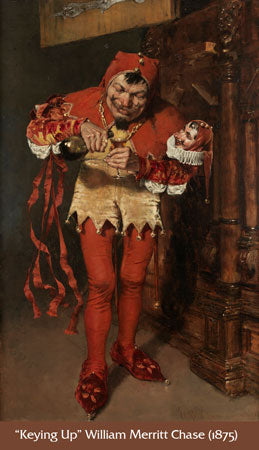Browse Categories
Add description, images, menus and links to your mega menu
A column with no settings can be used as a spacer
Link to your collections, sales and even external links
Add up to five columns
Add description, images, menus and links to your mega menu
A column with no settings can be used as a spacer
Link to your collections, sales and even external links
Add up to five columns
The Wit that Unmasked Kings: How Jesters Spoke Truth to Power
July 27, 2023 4 min read
Once upon a time, in the grand courts of medieval Europe, there danced a merry figure adorned in motley garb, always playing the fool—the jester!
A master of mirth and a connoisseur of comedic capers, the jester held a special place in the kingdom. Through witty jests and humorous hijinks, these courtly clowns weren't merely purveyors of laughter; they wielded the scepter of truth, revealing hidden realities others couldn't politely mention and hard truths that could be dangerous to debate. It was no job for a dolt or a coward, as the king, court, and kingdom relied on him for an assortment of special skills.
Today, we'll uncover the importance of jesters in a bygone era and how this truth-telling profession relates to modern comedians and social satire.
In the castles of yore, where royalty reigned and courtiers conspired, jesters pranced with unparalleled finesse amongst the powerful—their primary task - to amuse the highborn and lowborn alike. Through juggling, acrobatics, and quips so sharp they could cleave armor, jesters brought levity to the gravest of affairs and much-needed relief from the monotony of ceremony. With nimble tongues and a knack for merriment, they were the antidote to the gravity of the court in a time of hard living and high drama.
Under their humorous façade, however, lay a profound role as truth-tellers, wielding their words to challenge kings and reveal the unseen. Jesters occupied an extraordinary space within medieval society by cleverly navigating the intricate web of power dynamics in an era of absolutism in politics. Where speaking candidly to kings was often met with dire consequences, jesters possessed a unique ability to challenge monarchs and unveil startling truths through their mastery of satire, wielding humor as their weapon of choice.
One jestering responsibility crucial to the court and King was diplomacy. Kings and nobles schemed and plotted as a matter of daily life. They entertained VIPs, foreign leaders, diplomats, and nobility. The jester played a cunning hand in lifting spirits within these complex, often stress-filled formal events. Dancing from courtier to courtier, he gleaned secrets and insights, transforming himself into a jesting emissary; a well-placed joke at the right time could change a negotiation, and an overheard whisper could save a king's neck. In this way, the jester cleverly disguised his mission in performances and gags, all while conveying subtle messages to the monarch and their advisors.

Even in times of war, jesters were used on the battlefield. They would amuse the troops, annoy the opponents to the point of premature attacks, and even take on the dangerous task of delivering terms to the enemy.
Any fool unfortunate enough to carry a message that dissatisfies the recipient could find themselves loaded into a trebuchet and shot back to their army as a reply.
But they weren't just in the service of the King. In satire, jesters wore the mantle of truth-tellers for the entire kingdom. Under their motley guise, they unveiled profound observations and moral lessons through allegorical tales. With jests and japes, they tickled the conscience of the ruling class, slyly exposing the folly of unchecked power.
The court jester had the latitude to say what he wanted. It was all "just a joke," after all. By royal decree, everything that came out of their mouths was to be taken in "jest." However, it was always evident how the king and court reacted to the jester's jokes about sensitive topics. He brought up subjects that other royal court members would not dare to discuss in public. He even did so directly to the king's face!
The King's treatment of the jester was a sign to the Court and Kingdom of the King's character; the jester's fate was a litmus test for the monarch's true colors.
When a king's heart was light and receptive to humor, jesters thrived like well-watered gardens, sowing laughter across the realm. The King's acceptance of jests and truth revealed his capacity for humility and wisdom, ensuring a rule embraced by laughter and lightheartedness.
On the contrary, a king who bristled at the jester's japes and banished them from the court signaled a fragility of ego. A tyrant's intolerance for humor spoke volumes about their insecurity, hinting at a rule built on fear rather than love.
In a curious twist, the jester's mirthful dance mirrored the enigmatic dance of power. To the foolhardy, they served as cautionary figures, a reminder that authority bears a fragile façade. To enlightened monarchs, jesters' truth-telling became a mirror of wisdom, guiding them toward benevolent rule.

Fast forward to today's concert halls and television screens, where comedians wield the staff of satire and humor. As jesters of modernity, they carry the legacy of their courtly forebears.
In this new world of mass media and social platforms, comedians, like jesters, embrace satire's power to illuminate society's ills. Armed with punchlines and sharp wit, they confront the absurdity of political theatrics and social conventions. The court jesters of yore have evolved into brave jesters of the stage.
In the medieval court, jesters broke down barriers, uniting royalty and commoners with laughter. Similarly, modern comedians traverse cultural divides, tickling ribs and bridging gaps with their inclusive humor. In a world fraught with divisions, comedy becomes a unifier, heralding the shared laughter of camaraderie.
As torchbearers of truth, comedians today mirror the boldness of court jesters in their willingness to critique authority. Their jests are the Trojan horses of insights, infiltrating the citadel of power with humor and wit. In their audacity to speak uncomfortable truths, they echo the jesters of old, for whom mirth was a shield against reprisal.
From the jesters of medieval courts to the stand-up comedians of modern stages, the power of humor as a truth-teller has persisted through the ages. These mirthful messengers offer more than laughter; they wield the magic of satire to break barriers, reveal truths, and challenge authority. Just as the jester's treatment was a litmus test for the king's character, modern comedy also exposes the true essence of power.
As we revel in the comedic revival of jesters in contemporary comedians, let us remember the profound importance of humor in a free world. For in the symphony of satire and laughter, we find not only entertainment but also a timeless testament to the enduring spirit of truth-telling, the legacy of jesters, and the laughter of freedom!
1 Response
Leave a comment
Also in Liberty Maniacs News

Enemies of Satire: How Liberty Maniacs Survived Censors, Lawsuits, and the Joke Police
May 01, 2025 3 min read
True tales of the most powerful agencies, politicians, and brands who tried to censor our jokes—and what happened when we fought back.

You’re Not a Nazi. They Just Want You to Shut Up.
March 28, 2025 7 min read
They call you a Nazi so you’ll sit down and shut up—but the man who actually escaped them would say you’re nothing of the sort.

10+ Ways USAID Burns Your Tax Dollars on Pure Insanity
February 19, 2025 4 min read
USAID: where your tax dollars fund transgender operas, Taliban poppy fields, and luxury hotels for migrants—because actual humanitarian aid is so last century.
Recent Articles
- Enemies of Satire: How Liberty Maniacs Survived Censors, Lawsuits, and the Joke Police
- You’re Not a Nazi. They Just Want You to Shut Up.
- 10+ Ways USAID Burns Your Tax Dollars on Pure Insanity
- Trump’s Day-One War on the Government-Censorship Hydra
- The Ultimate Guide to Men's Clothing Sizing
- The Ideological Capture Behind the Woke Left's Meltdown Over Trump's 2024 Victory
- The Yuri Bezmenov Playbook: A Guide to Ideological Subversion
- 198 METHODS OF NONVIOLENT POLITICAL ACTION
- Why the 2nd Amendment is Awesome
- I Have A Nightmare
Sections You Might Like
Subscribe
Sign up to get the latest on sales, new releases and more …








Cornell Slaton
May 16, 2024
Helpful and insightful